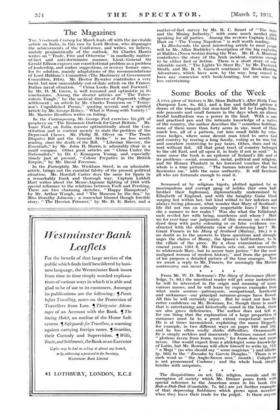The Magazines
THE. Nineteenth Century for March leads off with the inevitable article on India, in this case by Lord Meston, who disparages 'the achievements of the Conference, and writes, we believe, unduly pessimistically of the outlook. Sir Charles Harris writes on ` Trade, Free and Otherwise " in markedly matter- of-fact and anti-doctrinaire manner. Lieut.-General Sir Gerald Ellison exposes our constitutional problem as a problem -of leadership, and makes suggestions, or revives former ones, for its solution, mainly adaptations of the recommendations 'of Lord Haldane's Committee (The Machinery of GovernMent Committee, 1918). Mr. Hector Bywater contributes a very lucid, but now unavoidably out-of-date article on the Franco- ;Italian naval situation.' China Looks Back and Forward," by Mr. 0. M. Green, is well reasoned and optimistic in its Conclusions. Among the shorter articles are " The Tuber- culosis Tangle," by the medical director of Papworth village 'settlement ; an article by Mr. Charles Tennyson on " Tenny- [son's Unpublished Poems," quoting several, and a spirited iortiele by Mr. George Robey, What is Wrong with Variety ?" Mr. Maurice Ileadlam writes on fishing.
In the Contemporary, Mr. George Peel exercises his gift of
Ion "The Economic Outlook for Great Britain. Mr. Isaac Foot, on India, reasons optimistically about the Con- 'Stitution and is content merely to state the problem of the Depressed Classes. Mr. Philip M. Oliver on " The Trade Disputes Bill and the General Strike " is no less worth reading since the death of the Bill. " Liberian Slavery, the Essentials," by Mr. John H. Harris, is admirably clear in a small compass. Other good articles are " China Under the Nationalists," by Dr. C. Kuangson Young, and, especially timely just at present, " Colour Prejudice in the British Empire," by Mr. David Freeman.
In the Fortnightly, Mr. Wickham Steed, in an admirable article, brings out the essential falsity of the present political situation. Mr. Horsfall Carter does the same for Spain in a remarkably frank and thorough way. Captain Liddell Hart writes about the Meuse-Argonne fighting of 1918 with special reference to the relations between Foch and Pershing. There are two charming sketches, " Happy Hampstead, ' by Mr. Arthur Waugh, and " The Museum by the Sea," by Miss Dorothy Johnson ; a somewhat blurred though forcible story, " The Hessian Prisoner," by Mr. H. E. Bates, and a
matter-of-fact survey by Mr. R. C. Smart of " The State and the Mining Industry," with some much needed pun speaking for all parties. Among the reviews Captain Liddell Hart on The Young Napoleon " is well worth reading.
In Black-woods, the most interesting article to most People will be Mr. Allan Baddeley's description of the big explosion at Halifax (Nova Scotia) during the War. Mr. H. A. Manhood contributes the story of the Irish incident, curious enough to be either fact or fiction. There is a short story of eon_ siderable merit, " The Lights Ye Steer By," by Mr. Frederick Sleath, and Mr. R. S. Garnett continues his Book-Hunting Adventures, which have now, by the way, long ceased to have any connexion with book-hunting, but are none the less entertaining.


























































 Previous page
Previous page